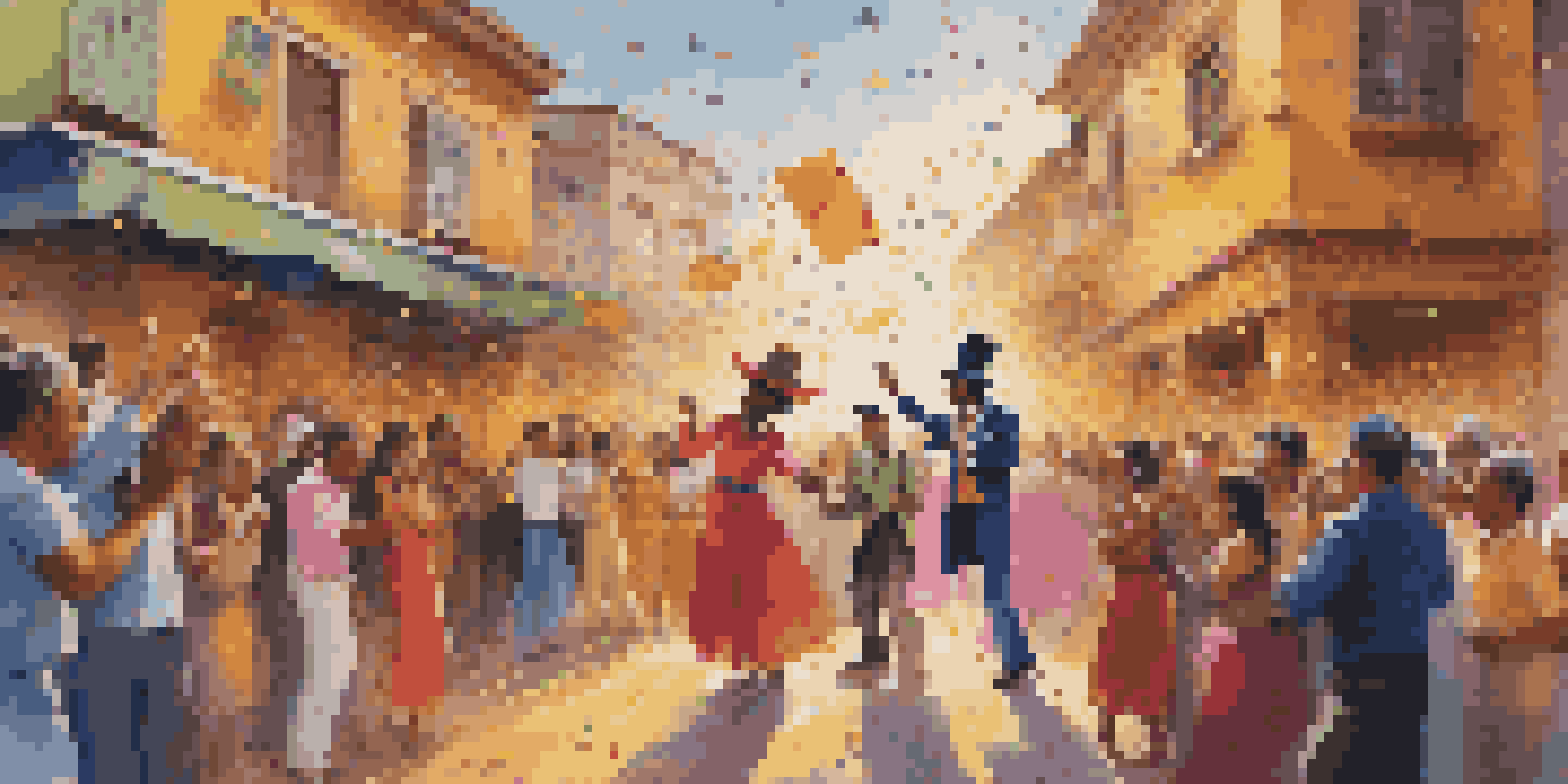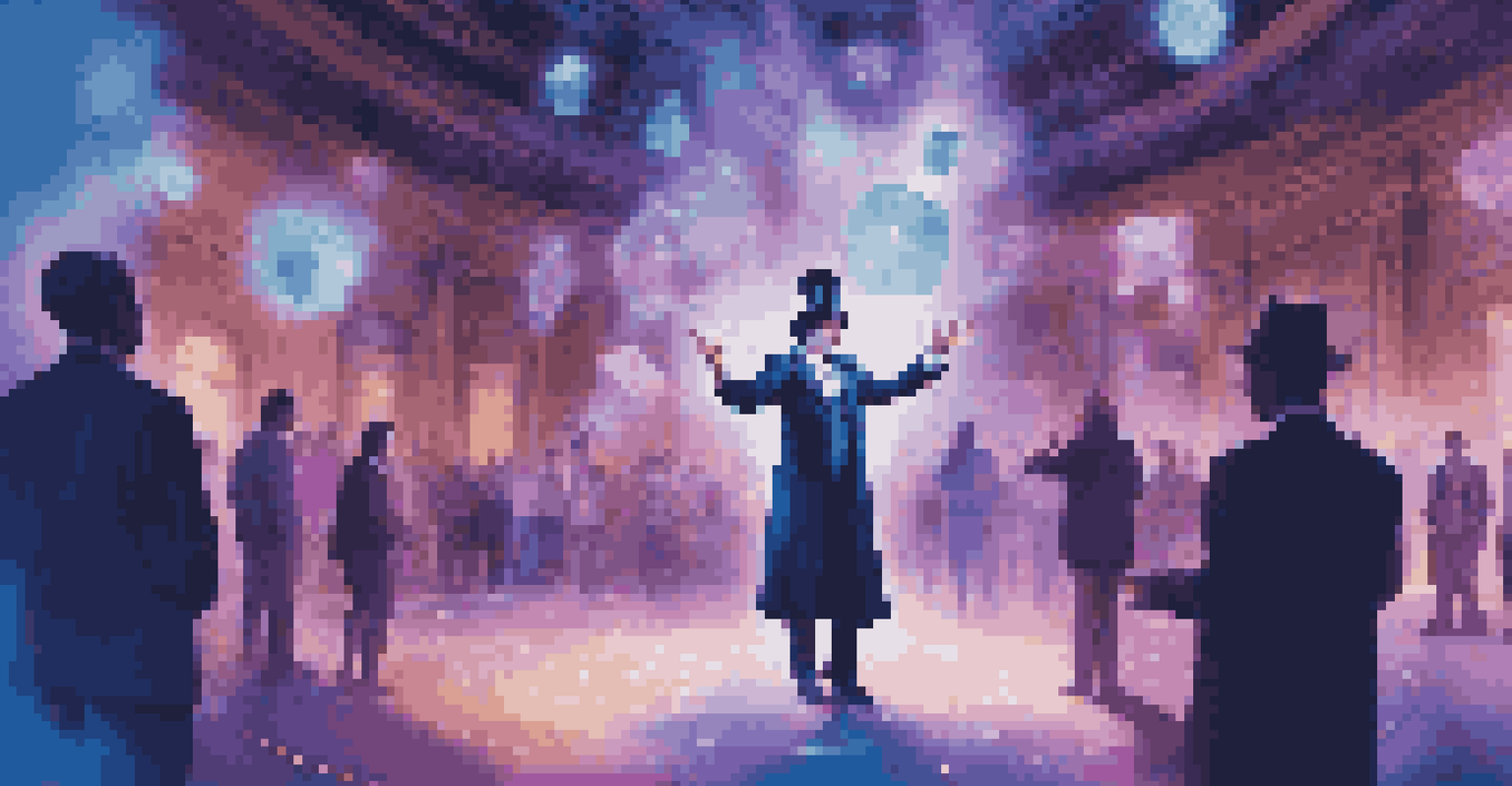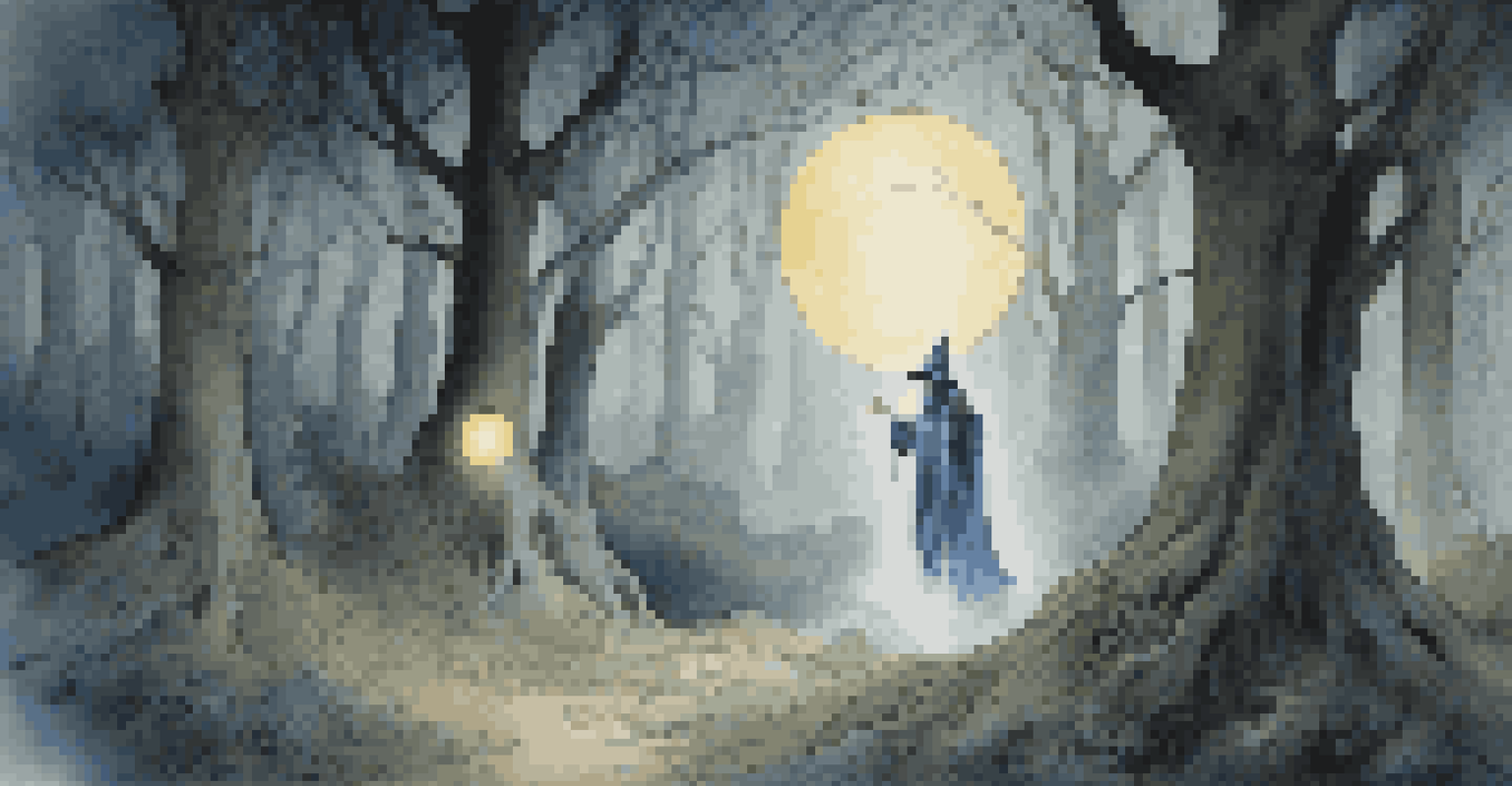Magic and Culture: How Illusions Reflect Societal Values

The Origins of Magic in Cultural Narratives
Magic has deep roots in various cultures, often intertwined with folklore and mythology. From ancient shamans to modern-day magicians, the art of illusion has served as a means to explain the inexplicable. Cultural narratives often frame magic as a bridge between the known and the unknown, reflecting societal fears, hopes, and values.
Magic is the highest form of hope.
These stories not only entertain but also teach moral lessons and cultural ideals. For instance, in many indigenous cultures, magic is used to connect with ancestors, showcasing respect for heritage and community. By examining these narratives, we can see how magic functions as a cultural mirror, revealing what societies hold dear.
Additionally, the evolution of magic reflects changing societal values. As cultures grow and adapt, so too do their magical practices, reflecting shifts in beliefs about the natural world, technology, and human connection. This interplay highlights the dynamic relationship between magic and culture.
Illusion as a Reflection of Human Experience
At its core, magic is an exploration of human perception and experience. Illusions challenge our understanding of reality, prompting us to question what we see and believe. This aspect of magic can be seen as a commentary on the complexities of human life, where appearances often differ from reality.

For example, a magician's trick might symbolize the idea that not everything is as it seems, resonating with societal themes of trust and deception. In today’s fast-paced world, where misinformation can spread quickly, this notion becomes even more relevant. Magic reminds us to be critical of what we accept as truth.
Magic Reflects Cultural Values
Cultural narratives frame magic as a bridge between the known and the unknown, revealing societal fears, hopes, and values.
Moreover, magic often elicits a sense of wonder and curiosity, reflecting humanity's innate desire to explore the unknown. This connection between magic and the human experience underscores the role of illusion in fostering creativity and imagination, essential components of cultural development.
Cultural Symbols and Their Magical Interpretations
Symbols play a significant role in both culture and magic, serving as vehicles for deeper meanings. Many magicians incorporate cultural symbols into their performances, creating a dialogue between the illusion and the audience's shared beliefs. These symbols can evoke nostalgia, pride, or even challenge societal norms.
The greatest illusion is that we have no illusions.
For example, a magician might use a traditional cultural artifact in their act, transforming its significance through the lens of magic. This not only enriches the performance but also invites the audience to reflect on their cultural identity and values. It showcases how magic can serve as a commentary on societal issues.
In this way, cultural symbols become a canvas for magic, allowing performers to engage with their audiences on multiple levels. By weaving these symbols into their acts, magicians can highlight cultural narratives that resonate deeply with viewers, fostering a sense of shared understanding and connection.
Magic and Social Commentary: A Tool for Change
Throughout history, magic has often been used as a platform for social commentary. Magicians have the unique ability to address societal issues through their acts, using humor and illusion to provoke thought and inspire change. This blend of entertainment and critique can challenge audiences to rethink their perspectives.
For instance, contemporary magicians might incorporate themes of inequality or environmental issues into their performances, engaging audiences in a dialogue about pressing matters. By doing so, they elevate magic beyond mere entertainment, positioning it as a tool for activism and awareness.
Illusion Challenges Perception
Magic serves as a commentary on human experience, prompting audiences to question reality and the truths they accept.
This aspect of magic reflects a society's willingness to confront uncomfortable truths and engage in meaningful conversations. Such performances can spark greater awareness and understanding, proving that magic is not just about tricks—it's also about fostering societal growth.
The Role of Technology in Modern Magic
As technology advances, so does the world of magic. Modern magicians are increasingly incorporating digital elements, creating illusions that were once unimaginable. This evolution reflects society's fascination with technology and its implications, showcasing both awe and apprehension about the future.
For instance, the use of augmented reality in magic acts can symbolize the merging of reality and digital experiences. This not only enhances the spectacle but also mirrors our society's growing reliance on technology to shape our perceptions. Audiences are left contemplating the boundaries between the real and the virtual.
Moreover, the integration of technology into magic can serve as a metaphor for the complexities of modern life. As we navigate a world filled with information overload and digital distractions, magic becomes a playful reminder to pause and reflect on our experiences, encouraging a deeper engagement with the world around us.
Global Perspectives on Magic and Culture
Magic manifests differently across cultures, each with unique styles and traditions that reflect societal values. From the street performers of Brazil to the illusionists of Las Vegas, each cultural interpretation reveals something about the people who create and enjoy it. These diverse expressions of magic invite audiences to appreciate the richness of global cultures.
For example, in some cultures, magic is intertwined with spirituality, serving as a means to connect with the divine. In others, it functions as pure entertainment, highlighting the cultural importance placed on joy and celebration. These varying perspectives on magic illustrate how deeply it is woven into the fabric of societal life.
Technology Shapes Modern Magic
The incorporation of digital elements in magic reflects society's fascination with technology and its implications for our perceptions.
By exploring global magic traditions, we gain insight into the values and beliefs that shape different communities. This cross-cultural exchange fosters mutual understanding and appreciation, highlighting the universal human experience that binds us all together, regardless of our backgrounds.
The Future of Magic in Cultural Contexts
As society continues to evolve, so too will the art of magic. The future of magic lies in its ability to adapt to changing cultural landscapes, reflecting contemporary issues and values. This adaptability ensures that magic remains relevant, resonating with audiences in new and exciting ways.
For instance, as conversations about diversity and inclusion gain prominence, we may see more magicians from varied backgrounds sharing their stories through their acts. This shift can enrich the art form, bringing fresh perspectives and fostering a more inclusive environment within the magic community.

Ultimately, the future of magic will depend on its capacity to engage with societal changes while remaining true to its core principles of wonder and curiosity. As a reflection of cultural values, magic will continue to inspire, challenge, and connect us in meaningful ways.